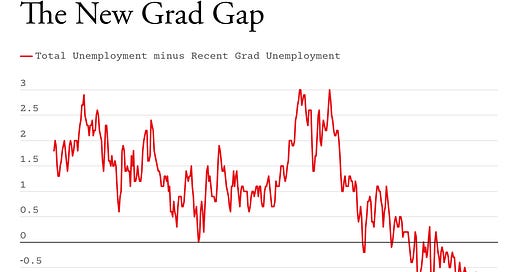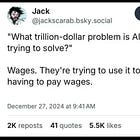The AI Apocalypse is beginning (in the workforce)
Storm clouds on employment are on the horizon, the omens are not looking good.
No, I am not going to talk about the 2GW of data centers that Microsoft has paused (or canceled, depending on your sources), or the recent pause that AWS (Amazon) just announced on their data center build out in the lead in to their Q1 earnings (due tomorrow, May 1 after close). That is worrying, because it indicates that the era of VC’s and the hyper scalers throwing insane amounts of cash at the Generative AI darlings (that are mostly good at collecting $1, while spending $2.35 to service that revenue - a.k.a. that is a loss per query)
No, instead I am going to talk about the rush to replace people with AI, and a recent Atlantic piece lays this out.
Something Alarming is Happening to the Job Market (gifted link)
In this article, Derek Thompson lays out that there are some oddities in the recent jobs. He leads off with this:
According to the New York Federal Reserve, labor conditions for recent college graduates have “deteriorated noticeably” in the past few months, and the unemployment rate now stands at an unusually high 5.8 percent. Even newly minted M.B.A.s from elite programs are struggling to find work. Meanwhile, law-school applications are surging—an ominous echo of when young people used graduate school to bunker down during the great financial crisis.
This is not surprising, as we are staring at a high probability that Trump will drive the US economy off the cliff, leading to a recession (or worse), and to be fair, recessions have affected these white collar roles first and worst.
This could be that the labor market for young professionals never truly recovered from the 2009 GFC and the global recession that ensued. And that is surely part of it.
Yet, there are some other factors. The 2010s were a banner decade for tech hiring, that if you had a relevant degree (comp sci, or other STEM field) and during the pandemic, these roles further exploded in demand, with engineers being able to pick and choose their preferences in comp packages and perks.
That is no longer the case. Starting in 2023 the number of staff reductions in the tech majors exploded, as the overhiring and ramp up that they felt that there were never going to be rainy days.
The majors used the pandemic boon to hoard tech talent, and they went NUTS.
That is unwinding. But it doesn’t completely explain what is happening. During the Biden Administration, as inflation went bonkers, this led to that belt tightening:
White-collar industries—especially technology—were among the hardest hit. The number of job openings in software development and IT operations plunged. The share of jobs posted on Indeed in software programming has declined by more than 50 percent since 2022. For new grads hoping to start a career in tech, consulting, or finance, the market simply isn’t that strong.
Again, that makes sense in the environment we are used to. Just business cycles being business cycles.
Yet, it seems that there is another factor…
The AI factor
I wrote a couple of weeks ago about AI, and what it is doing:
The net-net is that corporate executives are rubbing their grubby hands about using AI to replace a lot of labor.
I will leave you with a final pull-quote that wraps it all up:
A.I. may be a mid technology with limited use cases to justify its financial and environmental costs. But it is a stellar tool for demoralizing workers who can, in the blink of a digital eye, be categorized as waste. Whatever A.I. has the potential to become, in this political environment it is most powerful when it is aimed at demoralizing workers.
This sort of mid tech would, in a perfect world, go the way of classroom TVs and MOOCs. It would find its niche, mildly reshape the way white-collar workers work and Americans would mostly forget about its promise to transform our lives.
But we now live in a world where political might makes right. DOGE’s monthslong infomercial for A.I. reveals the difference that power can make to a mid technology. It does not have to be transformative to change how we live and work. In the wrong hands, mid tech is an antilabor hammer.
That was more focused on AI replacing people, and how it falls short. But that isn’t going to stop executives from forcing AI into the tranches.
The third theory is that the relatively weak labor market for college grads could be an early sign that artificial intelligence is starting to transform the economy.
“When you think from first principles about what generative AI can do, and what jobs it can replace, it’s the kind of things that young college grads have done” in white-collar firms, Deming told me. “They read and synthesize information and data. They produce reports and presentations.”
Consider, then, a novel economic indicator: the recent-grad gap. It’s the difference between the unemployment of young college graduates and the overall labor force. Going back four decades, young college graduates almost always have a lower—sometimes much lower—unemployment rate than the overall economy, because they are relatively cheap labor and have just spent four years marinating in a (theoretically) enriching environment.
This feels right. Alas, I am experiencing this in my company, a demand to prove why AI can’t do something we want/need to hire someone to do.
This is highlighting the trend of recent college grads participation being on a downward slide that began during the GFC in 2009, but the fact that this seems to be accelerating is concerning:
The strong interpretation of this graph is that it’s exactly what one would expect to see if firms replaced young workers with machines. As law firms leaned on AI for more paralegal work, and consulting firms realized that five 22-year-olds with ChatGPT could do the work of 20 recent grads, and tech firms turned over their software programming to a handful of superstars working with AI co-pilots, the entry level of America’s white-collar economy would contract. The chaotic Trump economy could make things worse. Recessions can accelerate technological change, as firms use the downturn to cut less efficient workers and squeeze productivity from whatever technology is available. And even if employers aren’t directly substituting AI for human workers, high spending on AI infrastructure may be crowding out spending on new hires.
It isn’t all bleak though, as I have been wont to describe, AI isn’t perfect, and it doesn’t really think. Alas, you need knowledgable humans to review and validate the output. It is not all roses though, as you probably can have one human reviewing the AI content that replaces ten earlier in career people. Still bleak for people to get on the rungs of the career ladder to rise into the formerly secure middle class roles.
I will leave you with a little optimism from the article:
Luckily for humans, though, skepticism of the strong interpretation is warranted. For one thing, supercharged productivity growth, which an intelligence explosion would likely produce, is hard to find in the data. For another, a New York Fed survey of firms released last year found that AI was having a negligible effect on hiring. Karin Kimbrough, the chief economist at LinkedIn, told me she’s not seeing clear evidence of job displacement due to AI just yet. Instead, she said, today’s grads are entering an uncertain economy where some businesses are so focused on tomorrow’s profit margin that they’re less willing to hire large numbers of entry-level workers, who “often take time to learn on the job.”
No matter the interpretation, the labor market for young grads is flashing a yellow light. It could be the signal of short-term economic drag, or medium-term changes to the value of the college degree, or long-term changes to the relationship between people and AI. This is a number to watch.
The future is gon’ be bumpy.





1. I’ll personally only have to worry if AI can replace me in retirement.
2. I have two kids in STEM fields but both have other skills that AI can’t replicate at this time. I’ll delete this from my worry list until/if that happens.
AI should be used to hunt down and cripple all the God damned scammers, spammers and thieves on the internet. Starting with the mofo who keeps trying to tell me I have an unpaid highway toll.